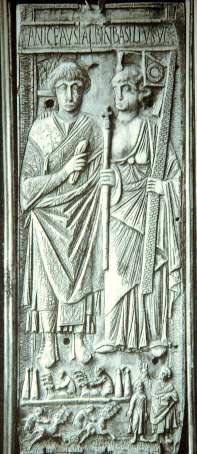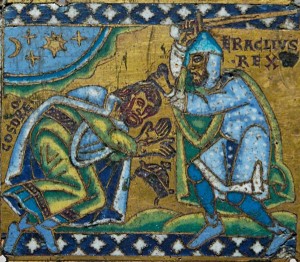 Listener John asked when exactly the office of the Consul died out. The Consulship was the highest office in Republican Rome, dating back to the hazy days in the sixth century BC when the last Etruscan King was expelled from the city. The two elected Consuls held most of the powers of a king, and dates were calculated from the start of their terms. With the rise of the empire, however, it became a largely symbolic office, and was mostly awarded by emperors to themselves. Its prestige was further diminished when later rulers started conferring it on imperial children (Caligula didn’t help matters when he announced that he was nominating his horse) and by the time of Justinian in the sixth century it was allowed to lapse from its yearly appointment. The last politician to hold it was a man with the impressive name of Anicius Faustus Albinus Basilius in 541 (that’s a picture of him at the top). He had the misfortune to be in Rome when Totilla and the Goths stormed it, and was forced to flee with his Consular robe into obscurity. That wasn’t quite the end of the office, however. It continued to exist as part of the coronation ceremony for another century. The last recorded emperor to receive the dignity was Justinian II who combined the Consulate with the office of Emperor. From then on the title seems to have been forgotten until the tenth century when the emperor Leo the Wise officially abolished it.
Listener John asked when exactly the office of the Consul died out. The Consulship was the highest office in Republican Rome, dating back to the hazy days in the sixth century BC when the last Etruscan King was expelled from the city. The two elected Consuls held most of the powers of a king, and dates were calculated from the start of their terms. With the rise of the empire, however, it became a largely symbolic office, and was mostly awarded by emperors to themselves. Its prestige was further diminished when later rulers started conferring it on imperial children (Caligula didn’t help matters when he announced that he was nominating his horse) and by the time of Justinian in the sixth century it was allowed to lapse from its yearly appointment. The last politician to hold it was a man with the impressive name of Anicius Faustus Albinus Basilius in 541 (that’s a picture of him at the top). He had the misfortune to be in Rome when Totilla and the Goths stormed it, and was forced to flee with his Consular robe into obscurity. That wasn’t quite the end of the office, however. It continued to exist as part of the coronation ceremony for another century. The last recorded emperor to receive the dignity was Justinian II who combined the Consulate with the office of Emperor. From then on the title seems to have been forgotten until the tenth century when the emperor Leo the Wise officially abolished it.
 Reader Kevin asked this question and it’s one that I get a lot. The Islamic contribution to scientific learning is an important one and is widely taught in schools. They played a vital role both in the advancement of science and in its transmission to the West, specifically through Spain. What is frequently overlooked, however, is the Byzantine underpinnings of that achievement. Unlike the West where the pagan aspects of the classical past made it taboo, the East viewed it as inseparable from Christian society. The fourth century Church father Basil of Caesarea summed up the Byzantine position neatly in a pamphlet he wrote called ‘To Young Men, On How They Might Derive Profit from Pagan Literature’. The classical world, in other words, was a treasure trove to be mined- though with extreme caution. This is not to say that the Byzantines continued the Greek spirit of inquiry full bore, merely that they preserved the Greek legacy more or less intact. After the initial shock of Islamic conquest, when it became apparent that the empire wasn’t going to be swept away, relations with the rising Caliphate became more stable, allowing a cultural exchange. The Arabic world absorbed Greek learning and improved on it, pushing the frontiers of medicine and science during the brilliant High Caliphate. Those advances in learning fully belong to Arab genius, but they couldn’t have been accomplished without the preserved texts or tutors and scholars to translate them. These were all ultimately provided by Byzantium.
Reader Kevin asked this question and it’s one that I get a lot. The Islamic contribution to scientific learning is an important one and is widely taught in schools. They played a vital role both in the advancement of science and in its transmission to the West, specifically through Spain. What is frequently overlooked, however, is the Byzantine underpinnings of that achievement. Unlike the West where the pagan aspects of the classical past made it taboo, the East viewed it as inseparable from Christian society. The fourth century Church father Basil of Caesarea summed up the Byzantine position neatly in a pamphlet he wrote called ‘To Young Men, On How They Might Derive Profit from Pagan Literature’. The classical world, in other words, was a treasure trove to be mined- though with extreme caution. This is not to say that the Byzantines continued the Greek spirit of inquiry full bore, merely that they preserved the Greek legacy more or less intact. After the initial shock of Islamic conquest, when it became apparent that the empire wasn’t going to be swept away, relations with the rising Caliphate became more stable, allowing a cultural exchange. The Arabic world absorbed Greek learning and improved on it, pushing the frontiers of medicine and science during the brilliant High Caliphate. Those advances in learning fully belong to Arab genius, but they couldn’t have been accomplished without the preserved texts or tutors and scholars to translate them. These were all ultimately provided by Byzantium.
The empire played a similar catalyst role in the Renaissance. Byzantine émigrés traveled to the West and re-introduced the study of Greek classics, tutoring luminaries like Petrarch and Boccaccio in the process. Cosimo Medici was even so impressed by a lecture on Plato from a Byzantine scholar named Pletho, that he restarted the Academy in Florence. Obviously both the Renaissance and the Arab Enlightenment pushed the frontiers of knowledge in ways that were independent of Byzantium, but neither would have been possible without Byzantine pens.
 Listener John asked when exactly the office of the Consul died out. The Consulship was the highest office in Republican Rome, dating back to the hazy days in the sixth century BC when the last Etruscan King was expelled from the city. The two elected Consuls held most of the powers of a king, and dates were calculated from the start of their terms. With the rise of the empire, however, it became a largely symbolic office, and was mostly awarded by emperors to themselves. Its prestige was further diminished when later rulers started conferring it on imperial children (Caligula didn’t help matters when he announced that he was nominating his horse) and by the time of Justinian in the sixth century it was allowed to lapse from its yearly appointment. The last politician to hold it was a man with the impressive name of Anicius Faustus Albinus Basilius in 541 (that’s a picture of him at the top). He had the misfortune to be in Rome when Totilla and the Goths stormed it, and was forced to flee with his Consular robe into obscurity. That wasn’t quite the end of the office, however. It continued to exist as part of the coronation ceremony for another century. The last recorded emperor to receive the dignity was Justinian II who combined the Consulate with the office of Emperor. From then on the title seems to have been forgotten until the tenth century when the emperor Leo the Wise officially abolished it.
Listener John asked when exactly the office of the Consul died out. The Consulship was the highest office in Republican Rome, dating back to the hazy days in the sixth century BC when the last Etruscan King was expelled from the city. The two elected Consuls held most of the powers of a king, and dates were calculated from the start of their terms. With the rise of the empire, however, it became a largely symbolic office, and was mostly awarded by emperors to themselves. Its prestige was further diminished when later rulers started conferring it on imperial children (Caligula didn’t help matters when he announced that he was nominating his horse) and by the time of Justinian in the sixth century it was allowed to lapse from its yearly appointment. The last politician to hold it was a man with the impressive name of Anicius Faustus Albinus Basilius in 541 (that’s a picture of him at the top). He had the misfortune to be in Rome when Totilla and the Goths stormed it, and was forced to flee with his Consular robe into obscurity. That wasn’t quite the end of the office, however. It continued to exist as part of the coronation ceremony for another century. The last recorded emperor to receive the dignity was Justinian II who combined the Consulate with the office of Emperor. From then on the title seems to have been forgotten until the tenth century when the emperor Leo the Wise officially abolished it.